
Stone Washington
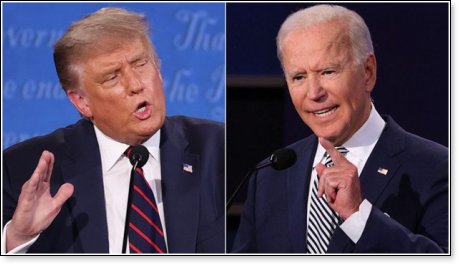
“Success is going to bring us together. We are on the road to success. But I’m cutting taxes, and he [Biden] wants to raise everybody’s taxes and he wants to put new regulations on everything. He will kill it. If he gets in, you will have a Depression, the likes of which you’ve never seen. Your 401(k)s will go to hell, and it’ll be a very, very sad day for this country.”
~ President Trump, Final Presidential Debate 2020
As the 2020 Presidential election has finally arrived, it is important for voters to be made fully aware to the political philosophies of both candidates. Running for re-election, President Donald Trump heads the Republican Party ticket and has led his first term in office with a bold and patriotic platform of America First, incorporating an uncompromising sense of conservativism, Nationalism and pro-Americana attitudes. Trump firmly believes in a strong and free America, unburdened by over-bearing taxes, governmental regulations, and self-inflicting global agreements/obligations (like the Paris Climate Accord, NAFTA and Obama’s secret Iran Deal) that unjustly shackle the independent spirit of freedom exemplified by the United States. President Trump has worked tirelessly to uphold the powerful campaign promises that have led to a freer, more independent and successful America, allowed to unlock the incredible reservoir of potential to restore greatness to a nation widely viewed as the greatest in the world.
By contrast, Democratic Presidential nominee Joe Biden believes in an America that is beholden to other global nations in areas like climate (where he vows to return America back the Paris Climate agreement if elected), nuclear armaments (co-sponsored the 2015 Iranian nuclear deal under Obama), and in taxes where he repeatedly vowed to raise the American people’s taxes and end the historic Trump tax-cut. In order to appeal to disfranchised Bernie Sanders Democrats, Biden has abandoned his formerly moderate Democrat position and adopted a far left Democratic-Socialism agenda that has incorporated the radical proposals of defeated 2020 Democratic Presidential candidates like Bernie Sanders (socialized medicine), Beto O’Rourke (gun confiscation/violating the 2nd Amendment), Elizabeth Warren (revamped taxes on the top earners), and even influential Democrats who didn’t run for office like AOC ($2 trillion climate plan/Green New Deal 2.0). Both President Trump and Joe Biden’s political philosophies speaks volumes to their individual characters and worth for public office. But some of their key political standpoints and policies leading up the 2020 election also reveal a historical connection and diametrical theoretical contrast between two of the most inspirational political theorists of antiquity, Thomas Hobbes and John Locke.
Who was John Locke and Thomas Hobbes?
John Locke (1632-1704) was a widely celebrated and distinguished English philosopher, revered by many as the “Father of Liberalism”. Locke’s upbringing was during one of the most riveting periods of history amid the English Civil War (1642-1651) in the midst of warring religious factions of Christianity (specifically Protestantism, Anglicanism and Catholicism). Locke was educated by many of the fathers of modern philosophy and reason, including Plato and Aristotle, yet like Thomas Hobbes, found little use from such Aristotelian philosophical learning at Oxford. Locke was inspired more by Francis Bacon, and paved a path for a greater understanding of empiricism, the reasoning which argued that what is known only derives from sensory experiences and empirical evidence rather theory and ideas, pertaining to mankind’s encounter with the unknown. This method of thinking is best portrayed in his work, “An Essay Concerning Human Understanding”.
Beyond this essay, John Locke is most famous for his book, “Second Treatise of Government and A Letter Concerning Toleration”, where he formulates an impassioned defense of the civil rights and liberties guaranteed to man by his Creator to pursue life as a free and independent being. Locke was one of the progenitors for limited governmental powers to be permitted to the ruling state, in addition to encompassing a divided sovereignty where power is disseminated to other individuals and groups operating as factions under the same government. This as opposed to one authoritative sovereign ruler with supreme power wielding dictatorial authority over the fearful masses, of which Thomas Hobbes advocates for. Locke’s ultimate philosophy presented and defended throughout his work is the concept of Liberalism, which is the political ideology of limited government and individual rights, working to restrain undue governmental authority, while respecting the natural rights and freedoms of mankind.
Locke’s embrace of individual freedom and autonomy goes so far as to encourage individuals to rebel or resist against a government that is deemed hostile to the rights of its citizens, believing that the fundamental law of nature is the preservation of mankind and that everyone has an obligation to preserve humanity by any means necessary. Locke firmly believes in the Natural Law of preserving individual property and that respecting a man’s property is essential to societal self-preservation. Locke voices his dissatisfaction of the gross abuse of power by any ruler or enforcer under the state imposing their private feelings or other such feeling that entitles them to use their power to brutalize the populace, which makes his logical reasoning directly antithetical to Thomas Hobbes. Locke’s rebuke of Hobbes’s absolutist philosophy is laid out in his Second Treatise of Government,
“As usurpation is the exercise of power, which another hath a right to; so tyranny is the exercise of power beyond right, which nobody can have a right to. And this is making use of the power any one has in his hands, not for the good of those who are under it, but for his own private separate advantage. When the governor, however intitled, makes not the law, but his will, the rule; and his commands and actions are not directed to the preservation of the properties of his people, but the satisfaction of his own ambition, revenge, covetousness, or any other irregular passion”.
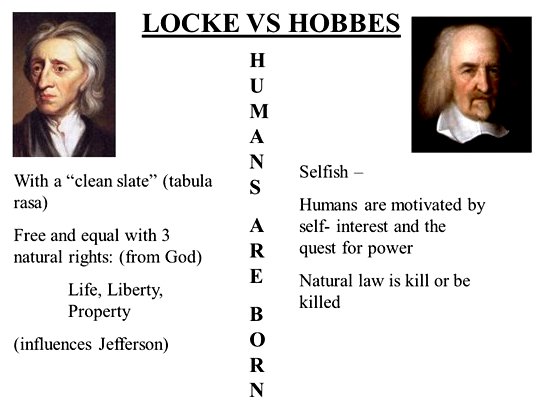
Thomas Hobbes (1588-1679), was a prominent English philosopher and considered one of the architects of modern philosophical thought, who, like Hobbes was educated in a similar way at Oxford. Hobbes also studied Plato and Aristotle but seemed to craft much of his own philosophical approach around the machinations of Machiavelli’s The Prince. Early in his career, Hobbes was known for his “Social Contract Theory”, which is “the method of justifying political principles or arrangements by appeal to the agreement that would be made among suitably situated rational, free, and equal persons”. This theory, while seemingly innocent and well-meaning, was actually the foundational development for Hobbes’s most distinguished area of philosophy pertaining to the all-powerful sovereign ruler governing the huddled masses under an position of absolute power (i.e. absolutism).
These ideas are best expressed in Hobbes’s most famous work, Leviathan (1651), where Hobbes presumes that humans are cogs in a complex societal machine, very much like programable bots with controlled, intertwined destinies. The people are expected to be governed and obedient to the absolute power of the state that reigns above them. Hobbes believes most humans are one-dimensional creatures void of a level of suitable level of reason and understanding, incapable of living in a stable, peaceful environment among one another without some form of “Leviathan”, or supreme ruler wielding power over their lives to keep them in check with the laws of the state.
In Leviathan, Hobbes lays out 19 laws of nature, which ordains the rules that rational citizens must follow under the command of the state. Hobbes’s view of good and evil are ultimately based on whether something is conducive to society; a prototypical understanding of utilitarianism, where individuals who contribute to society are deemed good, while those who hinder societal development are bad. Any crime that imperils the state is punishable by jailtime. Hobbes further deliberates in Leviathan that “the source of every crime, is some defect of the understanding; or some error in reasoning; or some sudden force of the passions. Defect in the understanding is ignorance; in reasoning, erroneous opinion.”
The Leviathan is depicted as a grotesque, immensely powerful entity representative of an over-bearing absolutist being who brutalizes and intimidates his citizens into fearful submission to deter criminality and insubordination. This brutal inspiration of obedience is symbolic of Machiavelli’s reasoning in The Prince, where he advocates for a strong, domineering and menacing ruler, over a benevolent or kindhearted sovereign; believing that “it is better to be feared than loved, if you cannot be both”.
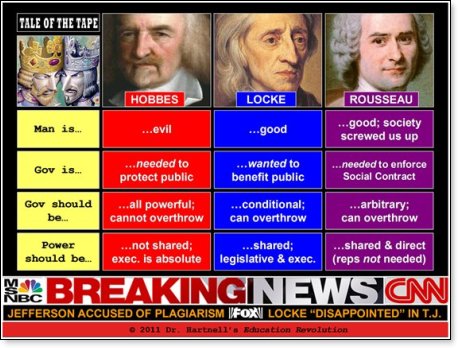
Election 2020: Trump channeling Locke vs. Biden enforcing Hobbes
Trump/Locke on the economy
President Trump has jump-started the American economy in a profound way that has benefited Americans from every socio-economic background and every minority group—Blacks, Hispanics, Asians—has experienced the lowest unemployment rate in 50 years (pre-covid-19). Trump’s benevolent revamping of the economy relates to John Locke’s view of producing a stable economy that works for the benefit of all of its citizens. President Trump implementing the Tax Cut and Jobs Act of 2017, which produced the largest tax cut in 30 years and tax relief for 82% of middle class families, of which relates to the pronouncement to reject and denounce over-taxation by the British, as expressed in Locke’s “Second Treatise of Government”, which the American colonies would closely adopt during the lead up to the American Revolution. Locke was notable for developing one of the earliest ideas that would lead to capitalism, which modern American (and by extension Trump) conservatism now embraces, advocating for the preservation of individual property as it is inherently monetized and has value, "by its constant production of saleable commodities it brings in a certain yearly income."
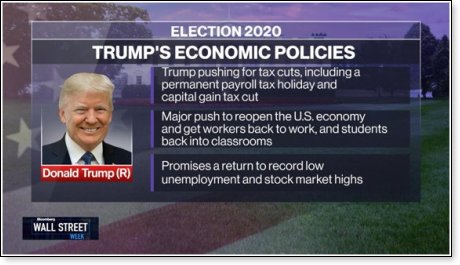
Biden/Hobbes on the economy
By comparison, Joe Biden has repeatedly and fearlessly emphasized that he will raise taxes on the average middle-class household if elected president. President Trump has even joked about Biden’s brazen declarations to raise, not cut people’s taxes, while he also seeks to repeal the wildly successful Tax Cut and Jobs Act of 2017. Biden has also pledged to full restore the individual mandate on Obamacare after it had been terminated under the Trump Administration. The mandate, which is was at the heart of former President Obama’s train wreck healthcare system, basically forces Americans who can afford healthcare, but choose not to purchase any plan, to pay a burdensome tax without any benefits.
Biden claims that his raised taxes would only be targeted toward corporations and the top 1%, but his words on the campaign trail have suggested otherwise, in addition to the fact that many of the Biden-Harris initiatives that would influence the economy, especially their climate plan, would cost trillions of dollars in order to implement, thus relying on taxing way more than just the top earners. Biden’s approach to over taxation and enhancing the size of the federal government directly correlates with a Hobbesian approach to authoritative governance via the Leviathan. Hobbes would view the whims of the people and their interests in preserving or spending their earned wages as trivial affairs that do nothing to enhance the all-powerful Leviathan state. Like Biden, Hobbes would be more willing to suggest that the people be taxed more severely and that the funds obtained be solely funneled to fuel the wants and needs of the governing ruler, not the citizens being unjustly taxed.
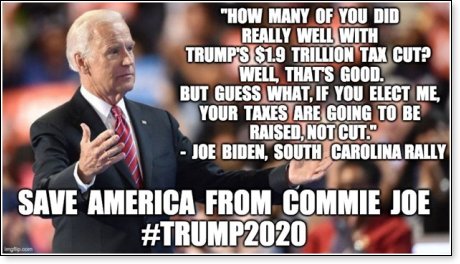
Trump/Locke on trade
President Trump has successfully reorganized America’s previously self-inflicting trade policies, by implementing a policy of fair and reciprocal trade. He has renegotiated and replaced trade deals like NAFTA that had been adding to the national deficit, imposing a much more economically stimulating alternative, USMCA (officially approved in 2020), in its place. Trump holding foreign countries, most notably China, accountable for their unfair, one-sided trade deals that disadvantaged America is straight from the Lockean perspective on trade, where he argued that countries should seek out a balance in trade (commercial balance) so as to avoid falling behind other nations and suffer trade losses; exactly what President Trump repeatedly lamented in his first years when undoing such devastating trade policies. President Trump has since restored a balance to America’s import and export ratio with foreign nations as best exemplified with Canada and China through USMCA, while winning the trade war with China in forcing their agreeing to the Phase I and Phase II deals, after harsh imposition of tariffs.
Biden/Hobbes on trade
Biden’s stance on trade can best be derived from his scandalous overseas dealings, while VP under Obama, in nations like China, Russia, Romania, Kazakhstan, and Ukraine, deliberately targeted for the shady nature pertaining to the loopholes in their unmonitored trade policies. As VP, Joe Biden served as Obama’s point man to Ukraine and leveraged his immense influence in the above countries in order to foster a series of unofficial money laundering and pay-for-play transactions to investment firms owned by his friends and family. The most notable benefactor to this corrupt process has been his son, Hunter Biden, who was appointed to the board of a natural gas company, Burisma, despite having no experience in the industry, while being paid $183,000 a month, all the while his father pressured (threatening to withhold money via quid pro quo) the Ukrainian government to fire the special prosecutor hired to investigate his son. Hunter’s firm also received $1.5 billion from a fraudulent Chinese deal during the time that VP Biden was visiting China under the guise of conducting official business.

This relates to Hobbesian view toward the Leviathan government as being absolutist, fostering every desire to fulfill its domestic needs and secure its interests overseas. Hobbes would be more willing to permit such corruptible and scandalous activity with foreign nations if it would benefit the sovereign in power, and better strengthen his rule over the unaware and powerless masses. A sovereign is not to distract away from his ambitious goals and iron-grip dictate by worrying about the illegality and unethical nature in trading influence for profit with foreign adversaries; if the sovereign emerges stronger and better funded, then it is to his gain to carry out such deals, even if under a veil of secrecy.
Trump/Locke on Politics
Whereas Locke’s political philosophy was in-part inspired from Hobbes’ Social Contract Theory, it nevertheless takes a completely opposite view on the position of man and human nature. Locke firmly believed that at its core, human nature was capable of good, defined by logical reasoning and tolerance toward others. As the likely inspiration for Thomas Jefferson’s famous “Life, Liberty and the pursuit of Happiness” line of the Declaration of Independence, was John Locke’s own view that every being was equal and independent, possessing a natural right to defend one’s "life, health, liberty, or possessions." President Trump’s own political views, grounded in conservative nationalism, adopt a similar approach to Lockean liberalism in that he believes strongly in the equality of man, firmly in the preservation of the American spirit and understanding that the American citizen should be free to pursue happiness relieved of burdensome governmental restraint (whether by tax or regulation).
Biden/Hobbes on Politics
Hobbes’ prevailing political theory can largely be derived from his concept of the Social Contract, where the citizens of a civil society were expected to cede some of their individual rights to the all-powerful sovereign, in exchange for protection in order to avoid death or the fear of it. This is the direct antithesis of founding father, Benjamin Franklin’s famous pro-liberty quote, “Those who would give up essential liberty, to purchase a little temporary safety, deserve neither liberty nor safety.” The power exercised by this sovereign authority is not to be resisted by the mob, since the protector's sovereign power derives from individuals' surrendering their own power for higher protection.
This empowerment by the mob speaks to Biden’s unwillingness to condemn America’s radically active and dangerous mob culture, mostly spurred through violent acts of terror committed by groups like Antifa and Black Lives Matter: looting stores, burning cars, blockading government buildings, etc. Biden’s newfound embrace of Bernie Sanders and AOC socialism has inspired his appeal to these anarchist Marxist groups, where he continually endorses social justice movements that are anti-police, Black nationalist, in favor of defunding police unions (despite being overwhelmingly Democrat in many major cities), and unsupportive of a strict law & order agenda (like President Trump’s) that takes proactive measures to curb mob violence and wanton acts of criminality.
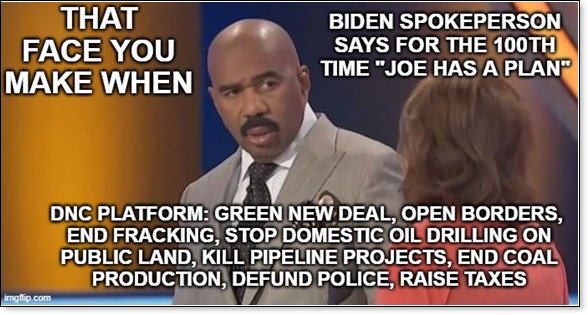
Closing Message to 2020 Voters
In closing, I urge every voter to make the conscientious decision to vote not with your emotions, but with your mind and spirit. Do not fall for the empathetic appeals made by Joe Biden, Kamala Harris (who 2 days from Election Day openly endorsed Communism and other Democrats), who especially rely on misconceptions surrounding the mortality rate and President Trump’s handling of the Covid-19 virus to scare people into voting for them. When casting a ballot on election day 2020, vote Biblically and wisely regarding the future of America and the choice for President, one who will serve the best interests for the American people and uphold a pro-God mindset when implementing policies for the benefit of the nation as a whole. As the comparative meme below indicates, the superior choice for president could not be clearer in what is the most important election of our lifetime:
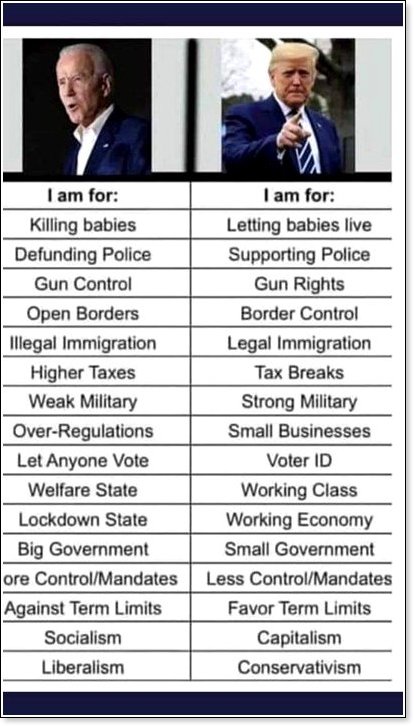
The views expressed by RenewAmerica columnists are their own and do not necessarily reflect the position of RenewAmerica or its affiliates.
















